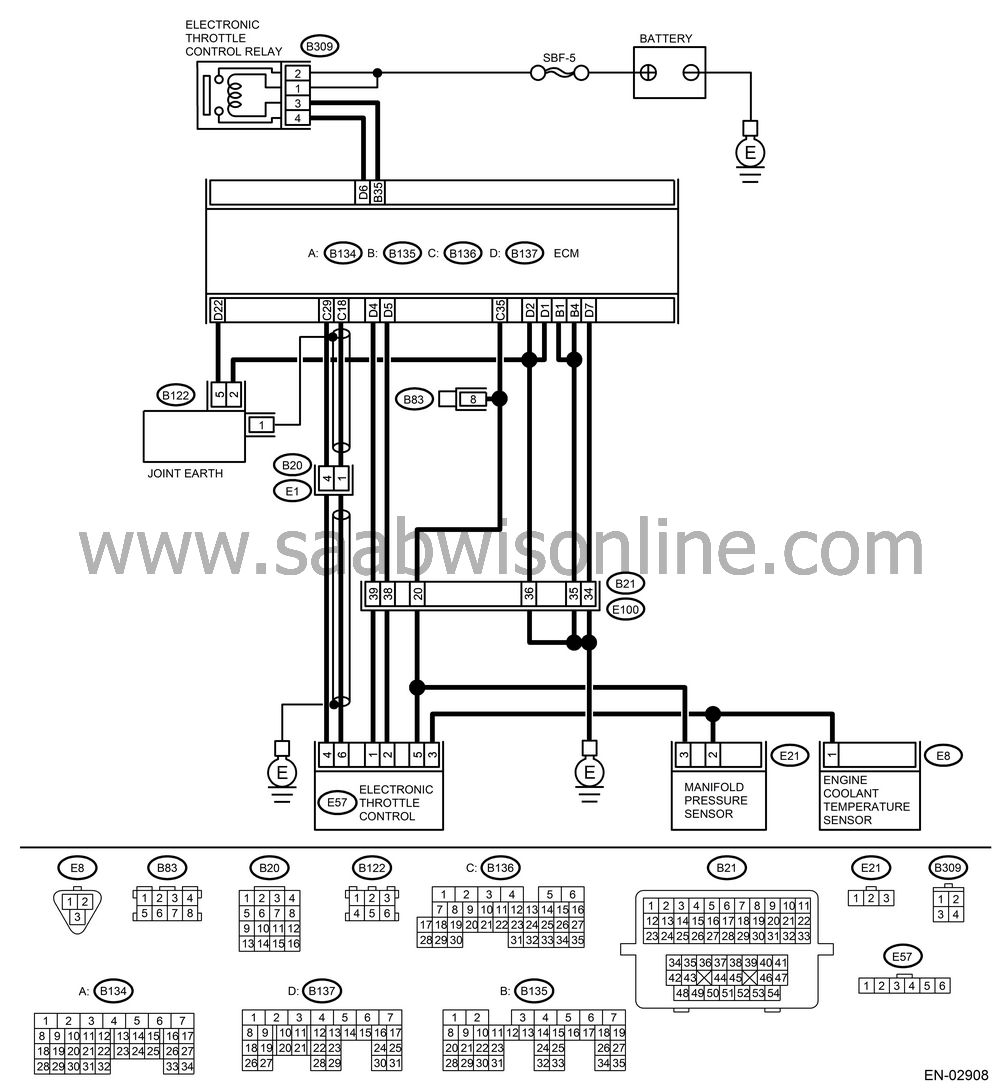DTC P2135 THROTTLE/PEDAL POSITION SENSOR/SWITCH “A”/“B” VOLTAGE RATIONALITY
| DTC P2135 THROTTLE/PEDAL POSITION SENSOR/SWITCH “A”/“B” VOLTAGE RATIONALITY |
DTC DETECTING CONDITION:
| • |
Immediately at fault recognition
|
|
| • |
GENERAL DESCRIPTION

|
|
TROUBLE SYMPTOM:
| • |
Erroneous idling
|
|
| • |
Poor driving performance
|
|
| Important | ||
|
After repair
or replacement of faulty parts, conduct Clear Memory Mode
|
||
WIRING DIAGRAM:

CHECK OUTPUT VOLTAGE OF ACCELERATOR POSITION SENSOR.
Turn the ignition switch to ON.Read the data of main throttle sensor signal, using Vehicle Diagnostic Interface.
Is the measured value more than 0.4 V?
| Yes |
| No |
CHECK OUTPUT VOLTAGE OF ACCELERATOR POSITION SENSOR.
Read the data of sub throttle sensor signal, using Vehicle Diagnostic Interface.Is the measured value more than 0.8 V?
| Yes |
| No |
CHECK POOR CONTACT IN CONNECTORS.
Check poor contact in connectors between ECM and electronic throttle control.Is there any poor contact in connectors between ECM and electronic throttle control?
| Yes |
Repair the poor contact in connectors.
| No |
CHECK HARNESS BETWEEN ECM AND ELECTRONIC THROTTLE CONTROL.
Turn the ignition switch to OFF.Disconnect the connector from ECM.
Disconnect the connector from electronic throttle control.
Measure the resistance between ECM connector and electronic throttle control connector.
Connector & terminal
(B136) No. 18 — (E57) No. 6:
(B136) No. 29 — (E57) No. 4:
Is the measured value less than 1 Ω?
| Yes |
| No |
Repair the open harness connector.
CHECK HARNESS BETWEEN ECM AND ELECTRONIC THROTTLE CONTROL.
Measure the resistance between ECM connector and chassis ground.Connector & terminal
(B136) No. 18 — Chassis ground:
(B136) No. 29 — Chassis ground:
Is the resistance more than 1 MΩ?
| Yes |
| No |
Repair the ground short of harness.
CHECK POWER SUPPLY TO SENSOR.
Connect the ECM connector.Turn the ignition switch to ON.
Measure the voltage between electronic throttle control connector and engine ground.
Connector & terminal
(E57) No. 5 (+) — Engine ground (−):
Is the measured value within 4.5 to 5.5 V?
| Yes |
| No |
Repair the poor contact in ECM connector. If problem persists, replace the ECM.
CHECK SHORT OF ECM.
Turn the ignition switch to OFF.Measure the resistance between electronic throttle control connector and engine ground.
Connector & terminal
(E57) No. 6 — Engine ground:
(E57) No. 4 — Engine ground:
Is the measured value more than 10 Ω?
| Yes |
| No |
Repair the poor contact in ECM connector. If problem persists, replace the ECM.
CHECK OUTPUT VOLTAGE OF ACCELERATOR POSITION SENSOR.
Connect all the connectors.Turn the ignition switch to ON.
Read the data of main throttle sensor signals, using Vehicle Diagnostic Interface.
Is the measured value less than 4.63 V?
| Yes |
| No |
CHECK OUTPUT VOLTAGE OF ACCELERATOR POSITION SENSOR.
Read the data of sub throttle sensor signals, using Vehicle Diagnostic Interface.Is the measured value less than 4.73 V?
| Yes |
| No |
CHECK POOR CONTACT IN CONNECTORS.
Check poor contact in connectors between ECM and electronic throttle control.Is there any poor contact in connectors between ECM and electronic throttle control?
| Yes |
Repair the poor contact in connectors.
| No |
Connector has returned to a normal condition at this time. A temporary poor contact in the connector might have been the cause.
CHECK HARNESS BETWEEN ECM AND ELECTRONIC THROTTLE CONTROL.
Turn the ignition switch to OFF.Disconnect the connector from ECM.
Disconnect the connector from electronic throttle control.
Measure the resistance between ECM connector and electronic throttle control connector.
Connector & terminal
(B136) No. 18 — (E57) No. 6:
(B136) No. 29 — (E57) No. 4:
Is the measured value less than 1 Ω?
| Yes |
| No |
Repair the open harness connector.
CHECK HARNESS BETWEEN ECM AND ELECTRONIC THROTTLE CONTROL.
Connect the ECM connector.Measure the resistance between electronic throttle control connector and engine ground.
Connector & terminal
(E57) No. 3 — Engine ground:
Is the measured value less than 5 Ω?
| Yes |
| No |
Repair the poor contact in ECM connector. If problem persists, replace the ECM.
CHECK HARNESS BETWEEN ECM AND ELECTRONIC THROTTLE CONTROL.
Connect the ECM connector.Turn the ignition switch to ON.
Measure the voltage between electronic throttle control connector and engine ground.
Connector & terminal
(E57) No. 5 (+) — Engine ground (−):
Is the measured value more than 10 V?
| Yes |
| No |
Repair the battery short of harness between ECM connector and electronic throttle control connector.
CHECK HARNESS BETWEEN ECM AND ELECTRONIC THROTTLE CONTROL.
Measure the voltage between electronic throttle control connector and engine ground.Connector & terminal
(E57) No. 6 (+) — Engine ground (−):
(E57) No. 4 (+) — Engine ground (−):
Is the measured value less than 10 V?
| Yes |
| No |
Repair the short of harness between ECM connector and electronic throttle control connector.
CHECK HARNESS BETWEEN ECM AND ELECTRONIC THROTTLE CONTROL.
Turn the ignition switch to OFF.Disconnect the electronic throttle control connector.
Measure the resistance between ECM connectors.
Connector & terminal
(B136) No. 18 (+) — (B136) No. 35 (−):
(B136) No. 29 (+) — (B136) No. 35 (−):
Is the measured value more than 1 MΩ?
| Yes |
| No |
Repair the short of power supply sensor.
CHECK ELECTRONIC THROTTLE CONTROL HARNESS.
Disconnect the connector from ECM.Disconnect the connector from electronic throttle control.
Measure the resistance between electronic throttle control connector terminals.
Connector & terminal
(E57) No. 6 — (E57) No. 4:
Is the measured value more than 1 MΩ?
| Yes |
Repair the poor contact in ECM connector. If problem persists, replace the ECM.
| No |
Repair the short of harness.


